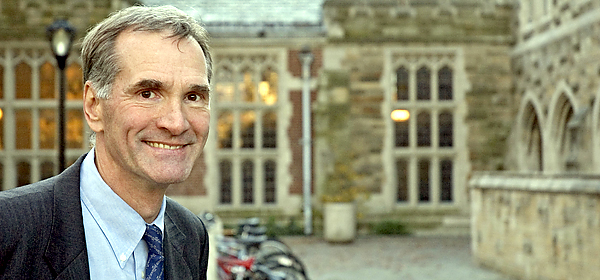Class News
David Swensen (Hon. '64) shapes Yale portfolio to address climate change
Yale Advances in Shaping Portfolio to Address Climate Change
The New York Times
April 12, 2016

Yale University has made progress in minimizing its endowment portfolio’s exposure to less environmentally sound investments such as stocks of companies that contribute to climate change, a letter released on Tuesday showed.
Yale generally does not manage its own investment directly but hires outside money managers to make decisions. Nearly two years ago, the Yale University Investment Office asked the firms that managed its endowment, then $20.8 billion, to assess their investments. The office asked managers to avoid investments that did not take sensible steps to reduce greenhouse-gas emissions. The Yale endowment, while not the largest, is closely watched by other universities and money managers who invest in publicly held companies.
On Tuesday, David F. Swensen, Yale’s chief investment officer, released a letter to the school’s Advisory Committee on Investor Responsibility saying that Yale had taken several steps with climate change in mind.
Rather than simply selling investments as a response to political pressures, Yale was asking its managers to consider the financial risks of climate change and the risks that those investments held if governments did impose carbon taxes. “What we did was to take a look at the economics and come up with an economically driven decision,” he said in a telephone interview. Mr. Swensen added that the reaction was heartening.
“When we sent out the letter, one of our energy-focused managers, Arc Financial, did an analysis of a carbon audit of every single energy position in the portfolio and assessed the exposure to more stringent emissions regulation,” he said. “They are using it as a tool when they make new investments. They also published a white paper on the issue.”
In his letter to the committee, Mr. Swensen pointed out that the firm developed “a framework for assessing, reporting, and comparing the greenhouse-gas intensity of fossil-fuel operations on an apples-to-apples basis.”
Two of Yale’s other money managers had positions that were not consistent with Yale’s approach, Mr. Swensen wrote. One held a small position in a company that engaged in the production and sale of coal. Another had interests on Yale’s behalf in two publicly traded oil-sands producers. Though the investments were valued at only $10 million in total, those positions have since been sold.
While it would not have been as easy for Yale to sell investments in individual companies because it does not manage most of its money internally, it still has some separate accounts that would allow the endowment to sell those stocks as it did when it sold holdings in South Africa and Sudan some years ago.
For example, the Yale endowment was close to making an investment in an energy company. “That investment had even been approved by the endowment’s board,” Mr. Swensen said. “But when we sat down with the company and brought up these issues, they denied it was a problem, so we did not go forward with the investment.”
The move came out of growing pressure from students concerned about environmental issues. Some universities have divested themselves of fossil-fuel stocks, while others have resisted action, arguing that they do not want to terminate a dialogue with such companies.
Mr. Swensen pioneered the use of alternative investments in such areas as hedge funds. Over the 20-year period that ended June 30, 2015, Yale had the strongest performance record in the endowment world. For that fiscal year, Yale turned in an 11.5 percent increase, bringing its endowment to $25.6 billion.
Mr. Swensen’s average return over 10 years ending June 2015 was 10 percent, slightly eclipsed by returns at M.I.T., Bowdoin College, and Princeton. At each of those schools, the endowment is led by a manager who trained under Mr. Swensen in the investment office at Yale.
Mr. Swensen recalled that the initial approach came up after Yale decided that it would not simply ask managers to sell shares in companies under question. Yale’s president, Peter Salovey, asked Mr. Swensen what the school could say, and the investment office came up with this plan.

